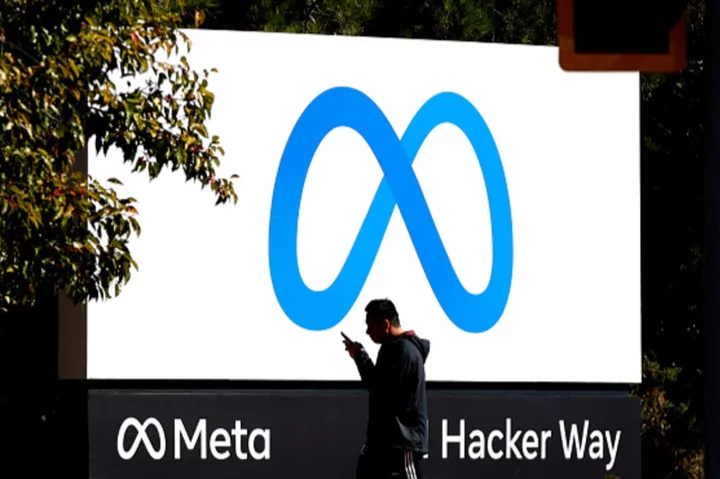
Amazon discloses 181 million users in EU in first store transparency report
(Corrects to add dropped word "store" in headline and paragraph 1) By Supantha Mukherjee STOCKHOLM (Reuters) -Amazon has more than
2023-10-25 18:27

Meta is being sued by 41 states over ‘addictive’ content allegedly harmful to children
Mark Zuckerberg's Meta is facing lawsuits from 41 states alleging there are addictive features aimed at hooking young users. The filings allege that Meta knowingly uses features on their platforms Instagram and Facebook to pull in and addict children. States are also claiming that Meta's algorithms were designed to coerce children into harmful content with features like "infinite scroll" and persistent notifications hoooking young users to continue using the app. Meta has been accused of violating federal privacy laws for children and consumer protection laws. The 233-page joint complaint obtained by Deadline, states: "Research has shown that young people's use of Meta's Social Media Platforms is associated with depression, anxiety, insomnia, interference with education and daily life, and many other negative outcomes. "Nonetheless, Meta has continued to deny and downplay these harmful effects to the pubic and to promote its Platforms as safe for young users." The complaint also said that the company's "motive is profit, and in seeking to maximise its financial gains, Meta has repeatedly misled the pubic about the substantial dangers of its Social Media Platforms." Weighing in on the lawsuit, a Meta spokesperson said: "We share the attorney general's commitment to providing teens with safe, positive experiences online, and have already introduced over 30 tools to support teens and their families. We're disappointed that instead of working productively with companies across the industry to create clear, age-appropriate standards for the many apps teens use, the attorneys general have chosen this path." In May, U.S. Surgeon General Vivek Murthy called social media a "profound risk" for youth and encouraged parents to restrict their children's access to it. Sign up to our free Indy100 weekly newsletter How to join the indy100's free WhatsApp channel Have your say in our news democracy. Click the upvote icon at the top of the page to help raise this article through the indy100 rankings.
2023-10-25 17:27

Inside the 8,000-year-old city at the bottom of the English channel
Ever wondered what’s hiding at the bottom of the English Channel? Deep sea divers do – partly because the cold waters and strong tides make it a notoriously difficult place to explore. One relic down there that few people have seen is the remains of an 8,000-year-old civilisation in an area called Doggerland – the landmass that once connected the British Isles to Europe. A National Geographic team led by scientist Albert Lin went down there in 2019 to find the so-called "lost city". The first thing they found were the remains of a tree, which had survived underwater for more than 8,000 years. As the divers went deeper, they came across a wooden structure that Lin thought could be a dock. “It feels like we are sitting in an ancient ghost town, but underwater,” he said. The existence of Doggerland was first confirmed in the late 19th century, but it wasn’t until about 100 years ago that ships started accidentally unearthing items of archaeological importance. In 1931, a trawler hauled up a lump of peat while fishing about 25 miles east of Norfolk. It contained an antler point, which was possibly used as a spear, dating from between 10,000BC and 4,000BC. Back on the surface, Lin described the wooden structure as “a whole platform down there. It's layered, one piece on top of the other, almost like a dock”. He added:” It’s cold down there and murky. But it's incredible. “You know, you descend down this line and out of the darkness comes the ancient past.” The wood survived because it was so deprived of oxygen, according to maritime archaeologist Garry Momber. “It's just preserved in a sort of anaerobic, oxygen-free environment. It would have stayed there for many more thousands of years. “But recently, the old landscape’s eroding away, which is how we found this.” The maritime archaeologist said finding composite structures like this was of 'international significance'. “It's 8,000 years old,” Momber added. “You don't just get these everyday.” Sign up for our free Indy100 weekly newsletter How to join the indy100's free WhatsApp channel Have your say in our news democracy. Click the upvote icon at the top of the page to help raise this article through the indy100 rankings
2023-10-25 15:19

Toyota aims to put 1,000 km-range Lexus EV on the road by 2026
TOKYO Toyota unveiled a Lexus concept car with a roughly 1,000 kilometre range on Wednesday that it aims
2023-10-25 14:29

Battery firm LG Energy Solution Q3 profit rises 40% on increased US output
By Heekyong Yang and Joyce Lee SEOUL (Reuters) -South Korean battery firm LG Energy Solution (LGES) on Wednesday posted a
2023-10-25 08:52

Fake placenames with anti-Israel messages flood Google Maps' depiction of the Rafah border crossing between Gaza and Egypt
When Google Maps users navigated to the Rafah border crossing between Gaza and Egypt on Tuesday, they might have seen placenames that included, "F**k Israel," and "May god curse Israel's Jerusalem."
2023-10-25 07:56

Microsoft's AI bets boost cloud business, Alphabet yet to find silver lining
By Akash Sriram and Anna Tong Google-parent Alphabet's cloud business suffered as long-time rival Microsoft's took off in
2023-10-25 07:54

AI being used to create child abuse imagery, watchdog warns
Thousands of AI-generated images depicting real victims of child sexual abuse threaten to “overwhelm” the internet, a watchdog has warned. The Internet Watch Foundation (IWF), the UK organisation responsible for detecting and removing child sexual abuse imagery from the internet, said its “worst nightmares” have come true. The IWF said criminals were now using the faces and bodies of real children who have appeared in confirmed abuse imagery to create new images of sexual abuse through artificial intelligence technology. The data published by the organisation said the most convincing imagery would be difficult even for trained analysts to distinguish from actual photographs, and some content was now realistic enough to be treated as real imagery under UK law. The IWF warned that the technology was only improving and would pose more obstacles for watchdogs and law enforcement agencies to tackle the problem. The research comes ahead of the UK hosting the AI safety summit next week, where world leaders and tech giants will discuss the developing issues around artificial intelligence. In its latest research, the IWF said it had also found evidence of the commercialisation of AI-generated imagery, and warned that the technology was being used to “nudify” images of children whose clothed images had been uploaded online for legitimate reasons. In addition, it said AI image tech was being used to create images of celebrities who had been “de-aged” and depicted as children in sexual abuse scenarios. In a single month, the IWF said it investigated 11,108 AI images which had been shared on a dark web child abuse forum. Earlier this year, we warned AI imagery could soon become indistinguishable from real pictures of children suffering sexual abuse...We have now passed that point Susie Hargreaves, IWF Of these, 2,978 were confirmed as images which breached UK law and 2,562 were so realistic it said they would need to be treated the same as if they were real abuse images. Susie Hargreaves, chief executive of the IWF, said: “Our worst nightmares have come true. Earlier this year, we warned AI imagery could soon become indistinguishable from real pictures of children suffering sexual abuse, and that we could start to see this imagery proliferating in much greater numbers. We have now passed that point. “Chillingly, we are seeing criminals deliberately training their AI on real victims’ images who have already suffered abuse. “Children who have been raped in the past are now being incorporated into new scenarios because someone, somewhere, wants to see it. “As if it is not enough for victims to know their abuse may be being shared in some dark corner of the internet, now they risk being confronted with new images, of themselves being abused in new and horrendous ways not previously imagined. “This is not a hypothetical situation. We’re seeing this happening now. We’re seeing the numbers rise, and we have seen the sophistication and realism of this imagery reach new levels. “International collaboration is vital. It is an urgent problem which needs action now. If we don’t get a grip on this threat, this material threatens to overwhelm the internet.” The IWF said it feared that a deluge of AI-generated content could divert resources from detecting and removing real abuse, and in some instances could lead to missed opportunities to identify and safeguard real children. Read More More than 500 potential cyber attacks logged every second, BT says ChatGPT and other chatbots ‘can be tricked into making code for cyber attacks’ Tinder adds Matchmaker feature to let friends recommend potential dates Google and Meta withdraw from upcoming Web Summit ‘Game-changing’ facial recognition technology catches prolific shoplifters Facial recognition firm Clearview AI overturns UK data privacy fine
2023-10-25 07:25

More than 500 potential cyber attacks logged every second, BT says
More than 46 million signals of potential cyber attacks are spotted by cyber security experts every day around the world, according to new data from BT. The telecoms giant said more than 530 signals of potential attack were logged per second. It said hackers were relentlessly scanning devices connected to the internet looking for weaknesses by using automation and machine learning to identify vulnerabilities in cyber defences. The BT data showed that over the last 12 months the IT, defence, banking and insurance sectors were the most targeted by cyber criminals, followed by the retail, hospitality and education industries. According to the figures, around 785,000 cyber attacks also targeted charities over the last year. The company warned that these trends should be of greater concern when over half of businesses (61%) told a BT survey in May that they find keeping up with cyber security measures increasingly difficult. BT has published the figures to mark Cyber Security Awareness Month, and has also launched a new podcast series called True Cybercrime Stories by BT, which details the true stories behind some of the world’s most notable cyber attacks. Tris Morgan, manager director for security at BT, said: “The volume of cyber threats in the UK is rising at an alarming rate, so it’s really concerning that so many businesses and public services are leaving themselves open to attack. “The fabric of the modern business has changed, and there’s now more connected tech for hackers to exploit, more valuable data to target and a bigger prize at stake if they make it through. “With more than a million business customers, BT is the first line of cyber defence for organisations across the world – and we’re proud of our long heritage of protecting people, businesses and critical national infrastructure. That’s why we’re launching the True Cybercrime Stories podcast: to shine a light on the shocking impact this crime epidemic can have, raise awareness of the risks and encourage everyone to think about what they could be doing to protect our businesses and essential services.” Read More AI being used to create child abuse imagery, watchdog warns ChatGPT and other chatbots ‘can be tricked into making code for cyber attacks’ Tinder adds Matchmaker feature to let friends recommend potential dates
2023-10-25 07:15

Letitia James and 32 other attorneys general sue Meta for ‘harming youth’
Attorneys general from 33 states, including New York AG Letitia James, have filed a lawsuit against tech giant Meta alleging it designed harmful features that contributed to the youth mental health crisis. The lawsuit, filed in the Northern District of California, alleges that Mark Zuckerberg’s company knowingly created addictive and “psychologically manipulative” features targeted at young people while falsely assuring the public it was safe to use. Some of the features, they say, include infinite scrolling, filters that change a person’s face or body, notifications that call young people back to Meta’s social media platforms like Instagram and Facebook and more. “Meta has profited from children’s pain by intentionally designing its platforms with manipulative features that make children addicted to their platforms while lowering their self-esteem,” Ms James said in a statement. “Social media companies, including Meta, have contributed to a national youth mental health crisis and they must be held accountable,” she added. Multiple studies have shown that children and teenagers’ prolonged exposure to social media can have negative impacts on their mental health due to disrupting their sleep, exposing them to bullying, rumour spreading, unrealistic views of people’s lives and more Plaintiffs in the lawsuit allege that Meta internally knew the impact of social media on young people but denied and downplayed the potential harm anyway in order to maximize profit – something a Facebook whistleblower testified to Congress about in 2021. The lawsuit seeks to force Meta to drastically change some of its design features that they allege are harmful to young people as well as impose financial penalties under each state’s specific consumer protection law. In a statement provided to The Independent, a spokesperson for Meta said, “We share the attorneys general’s commitment to providing teens with safe, positive experiences online, and have already introduced over 30 tools to support teens and their families.” Some of the “tools” Meta has implemented to help young people include age verification, preventing content that promotes harmful behaviours, giving users the option to hide “like” counts, prompting young people to take breaks or set timers and more. “We’re disappointed that instead of working productively with companies across the industry to create clear, age-appropriate standards for the many apps teens use, the attorneys general have chosen this path,” the spokesperson added. The lawsuit is the latest action taken against tech giants as concern about the impact of social media on young people grows. Read More People’s Instagram posts are showing where they are not expected Google and Meta withdraw from upcoming Web Summit Mark Zuckerberg uses Meta’s new AI Ray-Bans to braid daughter’s hair WhatsApp update will change how you log in forever Instagram Threads adds yet more features as it tries to take over from Twitter Viral WhatsApp warning of cyberattack targeting Jewish people is fake
2023-10-25 06:23

Google-parent Alphabet's cloud division misses revenue estimates, as Microsoft’s cloud booms
By Max A. Cherney and Akash Sriram Google-parent Alphabet's cloud business crawled to its slowest in at least
2023-10-25 05:56

Microsoft sales beat estimates as customers prepare for AI rollout
By Yuvraj Malik, Stephen Nellis and Anna Tong (Reuters) -Microsoft on Tuesday beat Wall Street estimates for fiscal first-quarter results
2023-10-25 05:22
